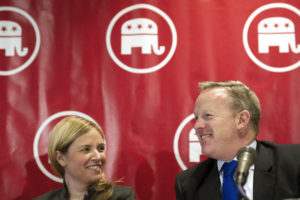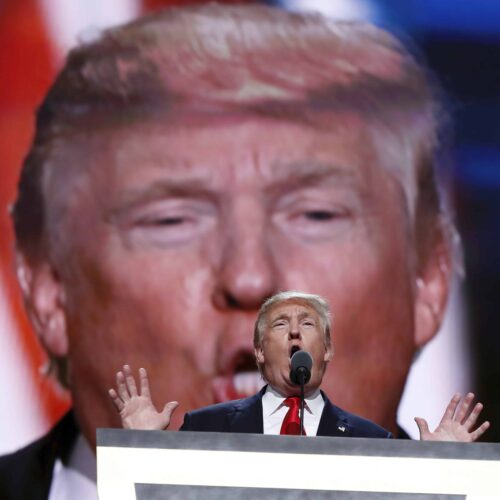Introduction
National political conventions, the high-profile gatherings at which parties anoint presidential nominees, typically feature big money flowing in non-transparent ways.
There’s no indication the 2020 Republican and Democratic conventions will be different. Cash is already starting to course through the secretive system, smoothing the way for powerful special interests to access — and potentially influence — public officials next summer.
The host committee for the 2020 Republican National Convention in Charlotte, North Carolina, has so far paid six figures in fundraising commissions to an opaque limited liability company, state disclosure documents show — with hundreds of thousands more dollars likely to follow.

It’s unclear who owns the limited liability company. But a search of public records showed the phone number for the company, disclosed by the host committee, is linked to Katie Walsh Shields, a longtime Republican operative who briefly served as Trump’s White House deputy chief of staff and is currently a senior adviser for data with the Republican National Committee.
Political convention fundraising can be lucrative for well-connected fundraisers who get the gig — something that’s perfectly legal. Past convention host committees have disclosed paying out seven figures in such commissions, often divided among multiple fundraisers.
Corporations, unions and special interests are permitted to write unlimited checks to convention host committees, which don’t have to disclose details about such contributions until 60 days after the event.
President Donald Trump has boasted of being the most “transparent president in history,” but the pledge is unlikely to change much about the conventions, which have long been targeted by reformers as the epicenter of influence peddling.
North Carolina state disclosures don’t so far disclose relationships between the Charlotte host committee and any fundraiser other than Red Strategy Group, which was incorporated in Virginia last year using the address of Holtzman Vogel Josefiak Torchinsky, a prominent political law firm.
In response to emails and phone messages requesting comment, Charlotte host committee CEO John Lassiter said the host committee does not comment on vendors.
“Obviously whatever we file we file, but we’re not going to talk about that until” the host committee files required disclosures 60 days after the convention, Lassiter said.
Shields did not respond to requests for comment submitted to the RNC or a message left on the phone number for Red Strategy Group.
The Charlotte host committee has disclosed paying Red Strategy Group roughly $180,000 in fundraising commissions as of July, the convention host committee reported on fundraising disclosure forms required by the state of North Carolina. The firm will be paid a commission between 1 and 5 percent on money it raises for the convention, according to the disclosure documents.
Separately, the RNC reported paying Red Strategy Group $50,000 for management consulting earlier this year. The money comes from an account earmarked for convention expenses. A search of campaign finance data available via the Federal Election Commission found no other payments to Red Strategy Group.
The RNC officially awarded Charlotte the convention in July 2018, and the Charlotte host committee is expected to raise $70 million for the convention. As of the end of July, Lassiter said the host committee had raised about 10 percent of that.
The Democratic convention wasn’t awarded to Milwaukee until March 2019; that host committee, too, has set a goal of $70 million. The Center for Public Integrity was unable to find fundraising disclosures for the Democratic host committee.
Shields helped lead the RNC’s fundraising operation during the 2014 cycle and later became chief of staff. She joined the Trump White House early in the administration and left in March 2017, working with the Trump-supporting America First Policies, a “social welfare” nonprofit organization, before returning to the RNC. Currently, her Twitter bio lists the RNC as her only affiliation.
National party conventions are complicated.
They’re subject to a confusing jumble of ethics rules even experts have to dust off every four years. The rules governing members of the House and Senate aren’t interpreted identically, which makes planning events even harder.
The official agenda often competes with unofficial events, many sponsored by special interests: parties, concerts and receptions.
U.S. cities typically compete for the honor of hosting conventions, which comes with a days-long national spotlight and potential economic benefits — but also expensive security and logistical challenges..
Convention boosters say the 2012 Democratic National Convention, also conducted in Charlotte, had an estimated economic impact of $163 million; the city is hoping for a similar benefit from the 2020 Republican convention.
Read more in Money and Democracy
Elections
What third-quarter fundraising can tell us about 2020
Presidential campaign finance disclosures help gauge candidate viability and voter enthusiasm.
Elections
Why Minneapolis Mayor Jacob Frey took on Donald Trump — over police bills
Frey: ‘It’s my responsibility to look after the taxpayers’





Join the conversation
Show Comments